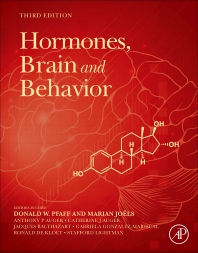Books in Neuroendocrinology
Books in Neuroendocrinology
- 1st Edition
- January 12, 2019
- George Fink
- English
- Hardback9 7 8 0 1 2 8 1 3 1 4 6 6
- eBook9 7 8 0 1 2 8 1 3 1 4 7 3

Stress: Physiology, Biochemistry, and Pathology
- 1st Edition
- January 17, 2017
- Mitchell G. Miglis
- English
- Hardback9 7 8 0 1 2 8 0 4 0 7 4 4
- eBook9 7 8 0 1 2 8 0 4 1 1 2 3

Sleep and Neurologic Disease
- 7th Edition
- March 28, 2017
- John A. Romas + 1 more
- English
- Paperback9 7 8 0 1 2 8 1 1 2 9 5 3
- eBook9 7 8 0 1 2 8 1 1 2 9 6 0

Practical Stress Management
- 1st Edition
- February 13, 2017
- Vsevolod Rozanov
- English
- Paperback9 7 8 0 1 2 8 0 5 1 9 9 3
- eBook9 7 8 0 1 2 8 0 5 2 8 6 0

Stress and Epigenetics in Suicide
- 3rd Edition
- November 9, 2016
- Donald W. Pfaff + 1 more
- English
- Hardback9 7 8 0 1 2 8 0 3 5 9 2 4
- eBook9 7 8 0 1 2 8 0 3 6 0 8 2

Hormones, Brain and Behavior
- 1st Edition
- March 10, 2016
- George Fink
- English
- Hardback9 7 8 0 1 2 8 0 0 9 5 1 2
- eBook9 7 8 0 1 2 8 0 1 1 3 7 9

Stress: Concepts, Cognition, Emotion, and Behavior
- 1st Edition
- December 15, 2016
- George Fink
- English
- Hardback9 7 8 0 1 2 8 0 2 1 7 5 0
- eBook9 7 8 0 1 2 8 0 2 4 2 3 2

Stress: Neuroendocrinology and Neurobiology
- 1st Edition
- April 27, 2015
- Edgar Garcia-Rill
- English
- Hardback9 7 8 0 1 2 8 0 1 3 8 5 4
- eBook9 7 8 0 1 2 8 0 1 6 3 2 9

Waking and the Reticular Activating System in Health and Disease
- 1st Edition
- September 14, 2015
- Rebecca M. Shansky
- English
- Hardback9 7 8 0 1 2 8 0 2 1 1 4 9
- eBook9 7 8 0 1 2 8 0 2 1 9 8 9

Sex Differences in the Central Nervous System
- 1st Edition
- January 20, 2015
- Kimberly Babson + 1 more
- English
- Hardback9 7 8 0 1 2 4 1 7 1 8 8 6
- eBook9 7 8 0 1 2 4 1 7 2 0 0 5

Sleep and Affect